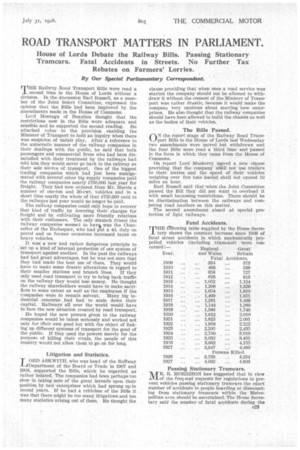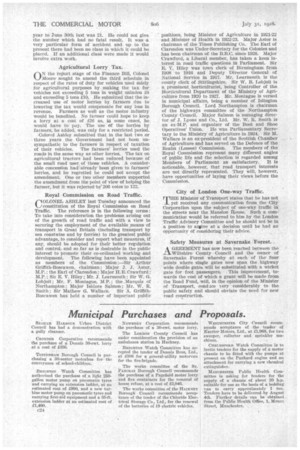ROAD TRANSPORT MATTERS IN PARLIAMENT.
Page 43

Page 44

If you've noticed an error in this article please click here to report it so we can fix it.
House of Lords Debate the Railway Bills. Passing Stationary Tramcars. Fatal Accidents in Streets. No Further Tax Rebates on Farmers' Lorries.
By Our Special Parliamentary Correspondent.
THE Railway Road Transport Bills were read a second time in the House of Lords without a division. In the discussion Earl Russell, as a member of the Joint Select Committee, expressed the opinion that the Bills had been improved by the amendments made in the House of Commons.
Lord Montagu of Beaulieu thought that the restrictions now in the Bills were adequate and sensible and he supported the second reading. He attached value to the provision enabling the Minister of Transport to hold an inquiry when there was suspicion of unfair play. After a reference to the autocratic manner of the railway companies in their dealings with the public, he said that both passengers and commercial firms who had been dissatisfied with their treatment by the railways had told him they would never go back to the railway as their sole sobrce of transport. One of the biggest trading companies which had just been amalgamated with several other big supply Companies paid the railway companies nearly £750,000 last year for freight. They had now ordered from Mr. Morris a number of one-ton and 30-cwt. vehicles and in a short time nearly the whole of that £750,000 paid_ to the railways last year would no longer be paid.
The railway companies could only hope to recover that kind of traffic by lowering their charges for freight and by cultivating more friendly relations with their customers. The only staunch friend the railway companies seemed to hay% was the Chancellor of the Exchequer, who had put a 4d. duty on petrol and on former occasions increased taxes on heavy vehicles.
It was a new and rather dangerous principle to set up a kind of internal protection of one system of transport against another. In the past the railways had had great advantages, but he was not sure that they had made the best use of them. They would' have to make some drastic alterations in regard to their smaller stations and branch lines. If they only used road transport to try to bring back traffic on the railway they would lose money. He thought the railway shareholders would have to make sacrifices to some extent as well as the employees if the companies were to remain solvent. Many big industrial concerns had had to scale down their capital. Railways all over the world would have to face the new situation created by road transport.
He hoped the new powers given to the railway companies would be taken seriously and worked not only for tfleir own good but with the object of linking up different systems of transport for the good of the public. If they used the powers merely for the purpose of killing their rivals, the people of this country would not allow them to go on for long.
Litigation and Statistics.
TORD ASKWITFI, who was head of the Railway
4Department of the Board or Trade in 1907 and 1908, supported the Bills, which he regarded as rather belated. The companies had been perhaps too slow in taking note of the great inroads upon their position by new enterprises which had sprung up in recent years. If he had a criticism of the Bills it was that there might be too many litigations and too many statistics arising out of them. He thought the
clause providing that when once a road service was started the company should not be allowed to withdraw it without the consent of the Minister of Transport was rather drastic, because it would make the company very cautious about starting 'new enterprises. He also thought that the railway companies should have been allowed to build the chassis as well as the bodies of their vehicles, , The Bills Passed.
/MIN the report stage of the Railway Road TransN./port Bills in the House of Lords last Wednesday two amendments were moved but withdrawn and the four Bills were read a third time and passed in the form in which they came from the House of Commons.
On report Lord Muskerry moved a new clause providing that the company 'shall not use trailers to their lorries and the speed of their vehicles weighing over five tons loaded shall not exceed 10 miles an hour.
Earl Russell said that-when the Joint Committee passed the Bill they did not want to overload it with. small harassing restrictions. There should be no discrimination between the railways and competing road hauliers on this matter.
The second amendment aimed at special protection of light railways.
Fatal Accidents.
I-11HE allowing table supplied by the Home Secretary shows the constant increase since 1908 of
fatal street accidents in , which mechanically propelled vehicles (including tramcars) were con cerned :England Great Year. and Wales. Britain
MR. R. MORRISON has suggested that in view of the frevent requests for regulations to prevent vehicles passing stationary tramcars the eiaet number of accidents to people boarding or, dismounting from stationary tramears within the Metropolitan at ea should be ascertained. 'The Home Secretary said the number of fatal accidents during the year to June 30th last was 21. He could not give the number which had no fatal result. It was a very particular form of accident and up to the present there had been no class in which it could be placed. If an additional class were made it would involve extra work.
Agricultural Lorry Tax.
ON the report stage of the Finance Bill, Colonel eMooresought to amend the third schedule in respect of the rates of duty for vehicles used solely for agricultural purposes by making the tax for . vehicles not exceeding 5 tons in weight unladen £6 and exceeding 5 tons £10. He submitted that the increased use of motor lorries by farmers .due to lowering the tax would compensate for any loss in revenue. Farmers as well as the motor industry would be benefited. No farmer could hope to keep a lorry at a cost of £20 as, in some cases', he would have to pay. The use of the lorries by farmers, he added, was only for a restricted period. Colonel Ashley submitted that in the last two or three years the Government had not been unsympathetic to the farmers in respect of taxation of their vehicles. The farmers' lorries used the roads in the same way as other lorries. The tax on agricultural tractors had been reduced because of the small road user of -those vehicles. A considerable concession had already been given to farmers' lorries, and he regretted he could not accept the amendment. One or two other members supported the amendment from the point of view of helping the farmer, but it was rejectedby' 206 votes to 122.
Royal Commission on Road Traffic.
COLONEL ASHLEY last Tuesday announced the l/constitution of the Royal Commission on Road Traffic. The reference is in the following terms : To take into consideration the problems arising out of the growth of road traffic and with a view to securing the employment of the available means of transport in Great Britain -(including transport by sea coastwise and by ferries) to the greatest public advantage,, to consider and report what measures, if any, should be adopted for their better re,gulation and control. and so far as is desirable in the public interest to promote their co-ordinated working and development. The following have been appointed as members of the Commission :—Sir Arthur Griffith-Boscawen, chairman; Major J. J. Astor, M.P.; the Earl of Clarendon ; Major H. El. Crawfurd ; M.P.; Sir E. V. Tilley; Mr. J. Learmouth ; Sir W. G. Lobjoit; Mr, F. Montague, M.P.; the ,Marquis of Northampton ; Major Isidore Salmon ; Mr. W. R. Smith ; Sir Mathew G. Wallace. Sir A. GriffithBoscawen has held a number of important public positions, being Minister of Agriculture in 1021-22 and Minister of Health in 1922-23. Major Astor is chairman of the Times Publishing Co, The Earl of Clarendon was Under-Secretary for the Colonies and has been chairman of the B.B.C. since 1926. Major Crawfurd, a Liberal member, has taken a keen interest in road traffic questions in Parliament. Sir E. V. Hiley was town clerk of Birmingham from 1908 to 1916 and Deputy Director General of National Service in 1917. Mr. Learmouth is the county clerk of Stitlingshire. Sir W. B. Lobjoit is a prominent horticulturist, being Controller of the Horticultural Department of the Ministry of Agriculture from 1920 to 1927. Mr. Montague is versed in municipal affairs, being a member of Islington Borough Council. Lord Northampton is chairman of the highways committee of the Northampton County Council. Major Salmon is managing director of J. Lyons and Co., Ltd. Mr. W. R. Smith is an ex-M.P. and organizer of the Boot and Shoe Operatives' Union. He was Parliamentary Secretary to the Ministry of Agriculture in 1924. Sir M. Wallace is an ex-president of the Scottish Chamber Of Agriculture and has served on the Defence of the Realm ,(Losses) Commission. The members of the Royal Commission represent many different angles of public life and the selection is regarded among Members of Parliament as satisfactory. It is noticeable, ,however, that road transport interests are not directly represented. They will, however, have opportunities of laying their views before the Commission.
City of London One-way Traffic.
rpnE Minister of Transport states that he has not _L yet received any communication from the City. Corporation upon the subject of one-way traffic in the streets near the Mansion house. Such a communication would be referred to him by the London Traffic Advisory Committee and he should not be in a position to angive at a decision until he had an opriortunity of considering their advice.
Safety Measures at Savernake Forest...
AGREEMENT has now been reached between the Wiltshire County Council and the owner of Savernake Forest whereby at each of the four points where single gates now span the highway wide double gates will be substituted with a wicket gate for foot passengers. This improvement, towards the cost of which a grant will he made from the Road Fund, will, in the opinion of the Minister of Transport, conclice very considerably to the public safety and should obviate the need for new road construction.








































































































